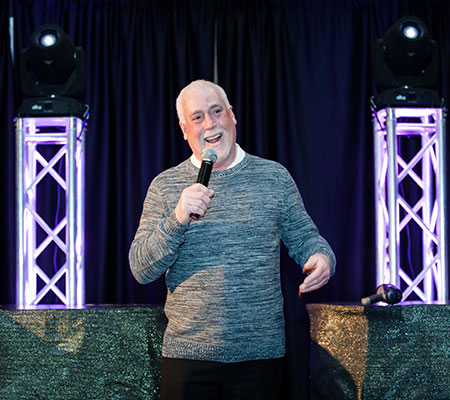
Don Cooper, pictured, was first diagnosed with cancer in 2008, and still remembers that day vividly.
“You have cancer.”
Don Cooper, from Stevens Point, Wisconsin, heard those words for the first time in 2008. That is when his doctors at Marshfield Clinic Health System discovered a large mass in his abdomen.
“I asked them right away when I started if there is something I did wrong, or something I could have done to avoid this,” said Cooper. “They said not with the type of cancer I had. It just happens.”
Dr. Jennifer Michels, a health psychologist with Marshfield Clinic Health System, explains that coping with the initial shock of getting a cancer diagnosis and the first cancer treatment is hard for any patient.
Treatment recommendations are often provided shortly after experiencing the stress of a cancer diagnosis,” said Michels. “It all happens quickly and can be overwhelming.”
Michels recommends that patients write down and ask a lot of questions when seeing their doctors the first few weeks after a cancer diagnosis. They can also reach out to a cancer care team member if they are struggling to cope with their diagnosis and the first cancer treatment.
“Anxiety is very common with a health crisis. This can be scary, but there is a care team to help answer your questions,” Michels said.
A cancer care team can include:
- An oncologist who determines the protocols.
- Nurses who help administer treatments and perform tests.
- A patient navigator who helps navigate the many hurdles in the process.
- A health psychologist who helps with anxiety and other feelings.
- An oncology social worker who plans and makes the process easier.
Michels furthermore encourages patients to involve family members in the process, consider joining a support group and talking to other cancer survivors.
Anxiety over tests and treatments
After a cancer diagnosis, the many tests and treatments that are part of the process also can cause you anxiety.
It may take time before your first cancer treatment start. Your doctors need to determine what type of cancer you have and how best to treat it. Biopsies and genetic testing are common tests that your care team may pursue.
“It is hard to wait, but important information can come from these tests to better personalize treatment recommendations for your type of cancer,” Michels said.
Once these assessments are complete, your doctor determines a plan of care and treatment often begins quickly.
“Patients often start treatment with fear about treatment effects,” Michels said. “They may worry about the degree of side effects they will face.” Side effects vary so patients usually benefit from actively working with their cancer care team to manage symptoms.
Cooper’s experience with his first chemotherapy pill was manageable.
“The first pill that I took, it didn’t even feel like I had cancer. The side effects were minimal,” Cooper said.
After eight years, his tumor came back. This time the surgeon removed a much smaller tumor than his first one. His oncologist also changed his chemotherapy pill because his previous one stopped working. This one caused him to have many more side effects.
With each chemotherapy protocol being different, Michels suggests talking to your care team about how the chemotherapy may affect you.
The cancer care team can be helpful with talking to you about what you might expect for side effects from treatment,” Michels said. “Distress can be decreased by seeking this type of information and preparing for it.”
Coping mechanisms
Asking questions often leads to better understanding and also allows patients to cope better. Performing specific tasks after your diagnosis can also help with coping.
“When patients can shift between use of different coping skills to fit their emotional and physical needs at various points in the treatment process, we tend to see better adjustment,” Michels said.
Teaching patients unique coping skills for their cancer journey and providing support to help them get through the specific challenges of a cancer diagnosis and treatment is the role of health psychology services and the entire oncology psychosocial services team.
For Cooper, the support from his family and friends helped him the most.
“It sure helps to have people supporting you,” he said. “I’ve gotten a lot of support between friends and family and people over at Marshfield Clinic Cancer Center-Stevens Point.”

